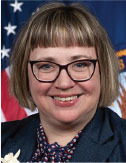
Leveraging Education to Support Care Delivery for VHA Western States Network Consortium
CARE COORDINATION AND INTEGRATED CASE MANAGEMENT AND WESTERN STATES NETWORK CONSORTIUM OVERVIEW
The Veterans Health Administration (VHA) has embarked on an enterprise- wide effort to streamline and standardize care coordination through an endorsed care coordination and integrated case management (CC&ICM) model of practice. Successful deployment relies on the development of a strategy to educate an expansive community of front-line care coordinators, care managers and case managers. A comprehensive education curriculum will weave together existing VHA case management standards of practice, the newly updated Case Management Society of America (CMSA) Standards of Practice for Case Management (2022) and VA-specific tools as essential steps in implementation.
CC&ICM deployment is facilitated by registered nurse and social work consultants from four regional networks called “consortia.” Established in 1998, the Western States Network Consortia (WSNC) is comprised of five Veteran Integrated Service Networks (VISNs) stretching from Texas to Washington and Alaska to Hawaii. WSNC serves 18 states, three U.S. territories and 40 VA healthcare systems that support more than 2,764,000 veterans and their caregivers. The current summary describes the educational strategy and efforts of the leads (one registered nurse and two social workers) for the VHA WSNC.
CONSORTIUM GOVERNANCE AND WSNC PRIORITIES OF WORK
Each consortium is managed through the formal governance of a board of regional leaders to identify and prioritize projects where best practices can be leveraged across VA facilities in that region. Similarly, the WSNC CC&ICM Council develops operational priorities to support the implementation and sustainment of CC&ICM within the five smaller regional bodies called VISNs. The WSNC CC&ICM Council aligns work with the charges provided by the WSNC board and develops recommendations and tools to be utilized across the 38 VA healthcare systems within its catchment area. The WSNC CC&ICM Council is comprised of nursing and social work co-champions, facility-level executive sponsors and subject matter experts from informatics and data.
The VHA CC&ICM model of practice charges facilities with connecting veterans identified as benefiting from moderate to complex levels of care coordination/case management interventions (through risk stratification and an assessment of complexity), with a lead coordinator to serve as a single point of contact within the VA healthcare system. After developing its initial charter in January 2022, the WSNC CC&ICM Council identified education of staff serving as lead coordinators as a central priority based on discussions with local facility leaders and staff. The members of the WSNC CC&ICM Council envisioned the powerful impact of a standardized, competency-based curriculum to raise the standards of case management practice and to reinforce systems integration:
Develop a WSNC CC&ICM educational platform with focus on foundational elements of lead coordinator role aligning with VHA Directive Integrated Case Management Practice Standards and approved certification body for specialty case management practice.
LEVERAGING EXISTING WORK OF VA SOUTHERN ARIZONA HEALTH CARE SYSTEM (TUCSON VA)
The WSNC CC&ICM Council identified a promising existing practice within the consortium from the Tucson VA. The Tucson team developed and piloted a virtual, day-long interactive training session on case management standards of practice at their home facility. Initial evaluation results were very positive, with attendees participating from across the facility’s care coordination community.
The Tucson VA CC&ICM team developed the curriculum by cross-walking the VHA CC&ICM lead coordinator competencies, the CMSA Standards of Practice (2022) and VHA Directive 1110.04(1), Integrated Case Management Standards of Practice (2020). The team reviewed all the documentation requirements for each of the VHA program offices’ requirements to identify responses to questions that may arise in the training sessions as a strategy to promote systems integration. Staff from care coordination programs across the facility were able to discover what they had in common with each other through the development of a case management-focused professional identity. Engaging case studies were used to demonstrate the importance of ethics while seamlessly connecting these relatable examples with the CMSA Standards of Practice, Commission for Case Manager Certification (CCMC) Code of Professional Conduct for Case Managers and social work and nursing codes of ethics.
The curriculum was also developed by a comprehensive gap analysis gathered through interviews with facility case managers, program directors and discharge planners from local community hospitals. The Tucson team engaged this stakeholder group to determine if the content was practical and applicable to the day-to-day workflow of case managers.
The Tucson team’s commitment to professional standards of practice and stakeholder feedback resulted in the following objectives:
- Demonstrate all clinical staff within the facility “speak the same language” regarding case management/CC&ICM terminology.
- Understand the “what, why, and how” principles of CC&ICM.
- Have foundational knowledge of the lead coordinator role.
- Understand the National Case Management Standards of Practice for registered nurses and social workers as written in the existing VHA Directive (1110.04(1), Integrated Case Management Standards of Practice, 2020).
- Reinforce the importance of ethics within case management.
- Understand the purpose and expectations of the VHA Complexity Assessment Tool.
- Demonstrate basic understanding of the Care Coordination Review Team (CCRT):
- Purpose
- Process
- Consults/referrals
- Lead coordinator assignment
- Documentation
- Monitoring progress
- Provide an opportunity for practical application of the content through small, breakout group sessions.
- Male veteran case study
- Female veteran case study
- Complete a basic biopsychosocial assessment
- Complete the VHA Complexity Assessment Tool
- Complete a basic treatment plan with two SMART goals
WSNC ADOPTION OF THE TUCSON TRAINING SERIES
The Tucson curriculum hit all the marks for comprehensive training: the curriculum provided a standardized lead coordinator training across the consortia, supported local CC&ICM implementation efforts and helped prepare case managers and leaders for case management certification. Education was identified consistently as a priority across the WSNC facilities for initial implementation and sustainment efforts. An ongoing, consortium-wide education program would take that off the plates of the facility sponsors and co-champions, freeing them up to focus on other implementation priorities. The WSNC CC&ICM Council recognized the value of a recurring and accessible educational program that offers contact hours/continuing education units (CEUs). The Education Workgroup also worked diligently to accredit the training for 7.5 CEUs through the following agencies:
- Joint Accreditation for Interprofessional Continuing Education (JAICPE)
- Accreditation Council for Continuing Medical Education (ACCME/ACCME-NP)
- American Nurses Credentialing Center (ANCC)
- American Psychological Association Commission on Accreditation (APA-CoA)
- New York State Education Department– Social Work (NYSED SW)
- Association of Social Work Boards (ASWB)
- National Board for Certified Counselors (NBCC)
Note that the above agencies include registered nurse and social work-related accreditation bodies as well as accreditation bodies for other related and relevant professions that support interprofessional collaboration for case management roles.
Beginning in October 2022, WSNC registered nurse and social work leads took ownership of the monthly training and began promoting the training to facility leaders so they could help spread awareness among front-line care coordinators/care managers/case managers. The original training format was a virtual, facilitator-led, eight-hour session. Currently, monthly sessions are scheduled through October 2023, in a variety of time zones, to accommodate as many WSNC staff as possible.
NEXT PHASE OF TRAINING DEVELOPMENT FOR WSNC
After delivering the first two monthly training sessions, and based on conversations with facility leaders regarding the frequency of the sessions and limits on the size of the courses, WSNC began to consider additional options to expand access by offering some of the portions of the training as recorded sessions to be completed by attendees as pre-work, with a plan to deliver virtual portions of the training in four-hour blocks. This would allow staff to more readily block clinical time for training and would allow WSNC to offer the training to more participants each month. WSNC hopes to begin the newly structured education delivery in January 2023.
SUPPORTING FRONT-LINE STAFF THROUGH EFFECTIVE TRAINING
WSNC remains committed to providing support to staff in their clinical roles, and lead coordinator training allows a large region of the country to offer a centralized training option. Case management remains a key strategy to improve healthcare delivery both within VHA and the private sector (Woodward & Rice 2015, Harris & Popejoy 2019). Optimizing staff’s ability to perform at the highest level of their ability/scope through ongoing and standardized training has been a positive first endeavor of the WSNC CC&ICM Council that members can be proud to celebrate.
REFERENCES
Case Management Society of America. (2022). Standards of Practice for Case Management. https://cmsa.org/sop22/.
Commission for Case Manager Certification (2018). Code of Professional Conduct for Case Managers. https://ccmcertification.org/sites/ccmc/files/docs/2022/CCMC-22-Code-Of-Conduct-Update-Final%20with%20CM%20def%20update.pdf.
Harris, R. C., & Popejoy, L. L. (2019). Case Management: An Evolving Role. Western journal of nursing research, 41(1), 3 – 5. https://doi.org/10.1177/0193945918797601.
United States Department of Veterans Affairs. Veterans Health Administration. (2020). Integrated Case Management Standards of Practice (VHA Directive 1110.04(1)).
Woodward, J., & Rice, E. (2015). Case management. The Nursing clinics of North America, 50(1), 109 – 121. https://doi.org/10.1016/j.cnur.2014.10.009.








